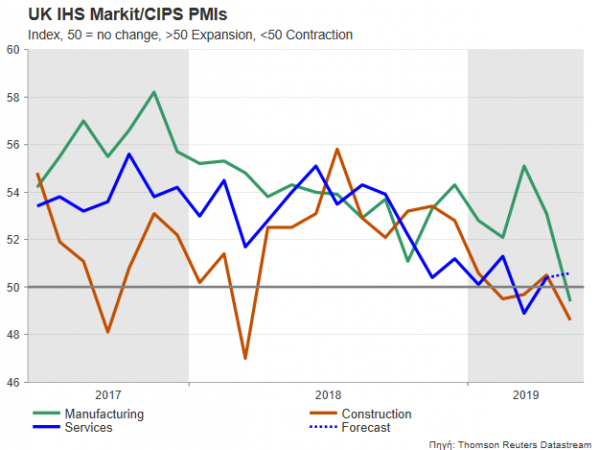The past four weeks have been the hardest so far this year for the British pound but also for UK manufacturers, the IHS Markit/CIPS readings showed on Monday. According to analysts, the survey for the services sector might bring better results on Wednesday at 0830 GMT. Still, the outcome may not be very pleasing, reflecting the disruptions from the Brexit paralysis.
In the first quarter of 2019, the British economy expanded at the fastest rate in more than a year as businesses rushed to build supplies of components and finished goods to avoid any supply disruption after the original March 29 Brexit deadline. Theresa May, however, could not pass her withdrawal plan through the parliament on time and with lawmakers struggling to find common ground, the EU and the UK have mutually agreed to postpone the exit date to October 31. Conditions got even more complicated after her Conservatives forced her to step down as the country’s leader on June 7, making unclear of when, how and even if Brexit will happen.
With Brexit uncertainty entering a new era, markets were not much surprised to see the manufacturing PMI for the month of May unexpectedly falling into the contraction territory on Monday, something evident from the low volatility in the pound at the time of the release. The survey on construction activity also displayed a shrinking sector, endorsing the rising risk aversion among businesses.
Wednesday’s Services PMI, though, could be key for investors as the sector accounts for 80% of the economy compared to manufacturing’s 15% and construction’s 5%. Expectations are for the measure to inch up to 50.6 from 50.4 in April and above the three-year low of 48.9 registered in March. Anyhow, as long as the measure holds close to the crucial 50 threshold that separates expansion from contraction, fears of a slowdown always remain.
Elevated wages and a smaller unemployment rate may have kept the measure marginally within the positive growth area. But since risks for a no deal Brexit are currently heating up and factories have already started to cut jobs for the second month in May, questions are rising about whether the recovery in the services sector could continue in coming months.
Another miss in the data could be a bad omen for the country’s Q2 growth outlook and a warning that expansion may weaken more than the Bank of England forecasted at its previous meeting, as the BoE Debuty governor David Ramsden also claimed on Saturday. GBPUSD may retest the 1.26-1.2560 region in the wake of a disappointing Services PMI reading, while a positive surprise could push the price back above the 50-period simple moving average (1.2655) and towards the 1.2720 barrier.
Nevertheless, politics and particularly the Brexit strategy of the new Tory leader, who will take up the position after the summer break, will determine the direction of the pound for the remainder of the year. Should the new Prime Minister hold a harsh stance against the divorce terms agreed with the EU, the UK could leave the bloc without a deal, pushing the pound sharply to the downside and closer to the 1.20 mark versus the dollar.
